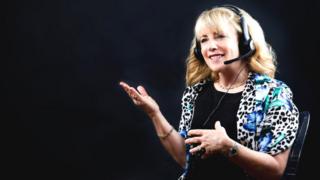‘I’m 72. My age is my biggest asset’
“As soon as women show any visible signs of ageing, they are viewed as not only less attractive, but less competent,” says 72-year-old Bonnie Marcus.
The founder of Bonnie Marcus Leadership in Santa Barbara, California, she coaches women on how to advance their careers and hosts the podcast Badass Women at Any Age. She argues that as women get older, they face the double whammy of sexism and ageism.
Tricia Cusden is the founder of Look Fabulous Forever, a make-up range for older women. “I’m 72 and I’m working as hard as I’ve ever worked,” she says. “In fact, my age is the biggest benefit. It’s my biggest asset,” she adds emphatically.
Tricia gave up her job as a consultant trainer in the corporate world in her mid-60s to look after her sick granddaughter. But when she got better and Tricia wasn’t needed anymore, she felt lost.
“I was very low and I felt very directionless. I didn’t have a life to go back to. And I thought I could live for another 30 years.”
The UN says the number of people over the age of 65 is growing faster than any other age group. It is expected to double in the next 30 years, while the number of people over 80 is projected to triple.
- Business Daily: Why doesn’t the economy care about older women?
- Will women have to work harder after the pandemic?
But as the workforce gets older, ageism is also becoming more of an issue. Statistics from charity Age UK show that ageism is the most common type of discrimination in Europe – and it is women who are bearing the brunt of it.
“It’s maddening,” says Bonnie. “If you look old, especially as a woman, you don’t have any value anymore. Our society worships youth and beauty.”
Tricia didn’t attempt to re-enter the workforce. Instead, she decided to start a new company – a make-up line for older women. Despite being told she would fail – by the man who makes the in-store displays of a designer make-up brand – seven years on she is the owner of a multimillion pound business.
“I just thought, ‘Well, you’re a stupid man and I’ll show you!'” she says, explaining that he had told her that if her idea was going to be successful, the big beauty businesses would already have thought of it.
He was wrong. Tricia’s YouTube channel, to which she posts daily, has had millions of views. And her 10-strong team on Look Fabulous Forever are now getting more orders than ever.
Tricia is one woman who has bucked the trend but, globally, older women are not only less represented in the workforce, they are less likely to be hired than an older man, according to the American Society on Ageing.
Men hold the majority of positions in power around the world, whether as a head of state or the boss of an organisation. In fact, women make up only 7% of Fortune 500 CEOs in the US and just 5% of the UK’s FTSE 100 CEOs.
“Above the unfairness, it doesn’t make economic sense,” says Bonnie Marcus. “Companies have to realise that women over 50 hold the purse strings.”
Indeed, harnessing older people in the workforce actually boosts a country’s GDP, according to accounting firm PwC. In its latest Golden Index Age, which looks at how countries utilise the power of older people in the labour market, it found that if the 37 countries in the Organisation for Economic Co-operation and Development (OECD) raised employment rates for the over-55s to New Zealand levels, the long-term GDP gain could be as much as $3.5 trillion (£2.7tn).
New Zealand is often held up as the poster child for female inclusion in all walks of life, whether it’s in the corporate world or the political one, having been led by a female Prime Minister, Jacinda Ardern, since 2017.
“We are fortunate here,” says Saunoamaali’i Dr Karanina Sumeo, New Zealand’s Equal Opportunities Commissioner. “If I look at our business sector, we’ve got some great leaders, who are women, holding CEO roles.
“You can have diversity, but you’ve got to be at the table where the decisions are being made. It’s really, really important.”
As the coronavirus pandemic grips the world, statistics globally show women are already being affected more in the economic fall-out. They are more likely than men to lose their jobs – and it is older women who are among the first to go.
However, the UK professional women’s network AllBright has found some good news. While Covid-19 is hitting women harder professionally, the group says one in four is setting up her own business as a result. Yet as a female entrepreneur, there is another hurdle to face and that is funding.
“Only 1% of venture capital goes to companies with all-female founders, and another 8% goes to companies with any female founders,” says Ruth Saunders, co-author of Female Entrepreneurs: The Secrets of Their Success.
“The reason is that the investor world is mainly men,” she says, claiming the knock-on effect is that women have to find money elsewhere. “Seventy-two percent of female entrepreneurs self-fund through friends and family, through credit cards, through crowdfunding. And so they struggle that much more.”
Tricia Cusden used her savings to start Look Fabulous Forever and went on to attract investors. She wants economies to realise the power and potential of older women.
She faced sexism in her corporate career in the 1980s and thinks it is more than time for businesses to step up.
“I do feel so sorry and desperate that 30, 40 years later, we’re still saying the same thing. You know, how could it still be the same? It’s crazy.”
- Life
- Elderly people
- Gender pay gap
- Lifestyle
- Feminism
- New Zealand
- Economic inequality
- Ageism
- Women
- Sexism
- Samoa
Source: Read Full Article



